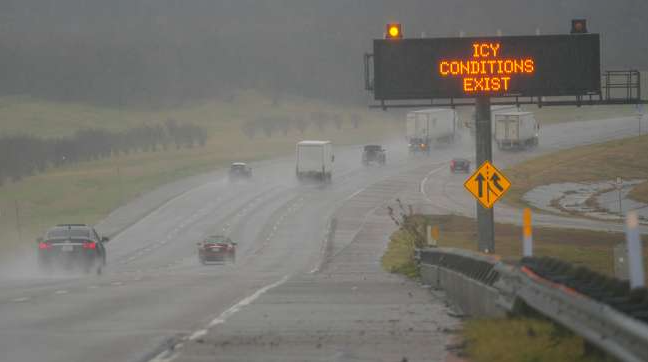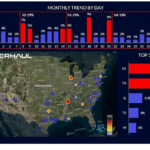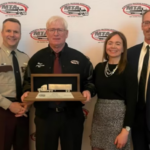DALLAS — A strong winter storm swept through Texas and Oklahoma, bringing heavy snow and icy roads before moving eastward into the southern United States on Jan. 10. The storm prompted governors to issue emergency declarations and forced schools to close throughout the region.
Arkansas Gov. Sarah Sanders deployed the National Guard to assist stranded drivers. Millions of students across a large stretch of southern states, including Texas, Georgia, and South Carolina, were impacted by school closures.
The National Weather Service predicted some of the heaviest snowfall on Jan. 10 in northern Arkansas and much of Tennessee, with accumulations ranging from 6 to 9 inches in certain areas.
Farther south, in Louisiana, Mississippi, and Alabama, a mix of sleet and freezing rain created hazardous travel conditions.
Central Oklahoma and northern Texas saw up to 7 inches of snow before the storm advanced into Arkansas. On Jan. 9, over 4,500 flights were delayed and an additional 2,000 canceled, with further disruptions expected on Jan. 10.
“I have not seen any accidents, but I have seen a couple of people get stuck out on the road and sliding around,” said Charles Daniel, a truck driver hauling a 48-foot trailer loaded with paint, auto parts and other supplies through slick, slushy roads in central Oklahoma on Jan. 9. “People do not need to be driving.”
The polar vortex, a mass of frigid air typically confined to the North Pole, occasionally drifts southward, affecting regions in the U.S., Europe, and Asia. Some scientists suggest these occurrences may be increasing due to the effects of global warming.
At the same time, unusual January wildfires broke out in the Los Angeles area, highlighting the extreme weather contrasts.
Paul Kirkwood, a meteorologist with the National Weather Service, noted that the storm that recently passed through Dallas is expected to produce a “band of snow” stretching across parts of Mississippi, Georgia, Tennessee, Kentucky, and the Carolinas.
❄️A winter storm is expected to bring heavy snow, freezing rain, & ice across the South over the next few days. Widespread snowfall of over 4" is expected, with isolated instances of 8" possible. Dangerous driving conditions, power outages, & downed branches are also possible. pic.twitter.com/WaDw6Qw67G
— NWS Weather Prediction Center (@NWSWPC) January 9, 2025
Texas Gov. Greg Abbott advised residents to stay off the roads if possible, as dangerous driving conditions were expected. Meanwhile, 75,000 fans were anticipated to gather at AT&T Stadium in Arlington on Jan. 10 for the college football championship semifinal between Texas and Ohio State in the Cotton Bowl.
The storm system was forecasted to move northeast by Jan. 10, bringing heavy snow and freezing rain to areas as far as the Virginia and North Carolina coasts. Parts of Georgia, North Carolina, Tennessee, and West Virginia could see up to 8 inches of snow by Jan. 11, according to the National Weather Service.
Georgia Gov. Brian Kemp declared a state of emergency on Jan. 9, as the northern portion of the state braced for snow and ice starting the morning of Jan. 10. Forecasters warned of significant snow and ice accumulation in metro Atlanta, which could lead to dangerous road conditions and potential power outages.
In response, public school systems across metro Atlanta and northern Georgia canceled in-person classes for Jan. 10, giving more than a million students a snow day or shifting them to online learning.
I have declared a statewide State of Emergency ahead of tomorrow’s inclement weather to ensure we are as prepared as possible for the winter storm.
— Governor Brian P. Kemp (@GovKemp) January 9, 2025
Hazardous conditions can develop quickly and make travel dangerous, so I encourage all Georgians to stay vigilant as transportation…
In Tennessee, Memphis-Shelby County Schools, the state’s largest district with over 100,000 students, shut down all schools on Jan. 10 due to a forecast of up to 8 inches of snow in Memphis. Officials opened two 24-hour warming centers to provide shelter for those needing relief from the cold.
South Carolina prepared for its first significant winter weather in three years. The Department of Transportation began treating highways and interstates with brine and salt from Columbia northward on Jan. 9. Schools in affected areas planned early dismissals, closures on Jan. 11, or switched to online learning.
In North Carolina, Gov. Josh Stein declared a state of emergency ahead of the storm. Forecasters predicted up to 3 inches of snow across much of the state, with higher totals in mountain areas, along with sleet and freezing rain. The weather also led to the cancellation of a public outdoor inauguration ceremony for Stein and other state officials in Raleigh, scheduled for Jan. 11.
Richmond, Virginia, was under a boil-water advisory following a power outage that disrupted the city’s water reservoir system on Jan. 6. Mayor Danny Avula stated bottled water was being distributed at 11 locations, with deliveries arranged for elderly residents and those unable to travel.
This report included contributions from Associated Press journalists Sean Murphy in Oklahoma City, Adrian Sainz in Memphis, Heather Hollingsworth in Kansas City, Charlotte Kramon in Atlanta, Jeffrey Collins in Columbia, Nadia Lathan in Austin, Ben Finley in Norfolk, Andrew DeMillo in Little Rock, Kimberly Chandler in Montgomery, John Raby in Cross Lanes, and Dylan Lovan in Louisville.





